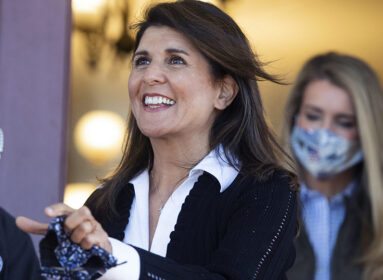
Nora Guthrie talks about the life and legacy of her father – and the Jewish influences that inspired him
By Judie Jacobson
 Born Woodrow Wilson Guthrie on July 14, 1912 in Okemah, Oklahoma, Woody Guthrie, as he came to be known, was one of the most significant figures in American folk music. His songs, many of which are archived in the Library of Congress – including the classic social justice song “This Land Is Your Land” – have inspired generations of Americans both politically and musically. His best friend was the renowned folk singer Pete Seeger and he counted among his disciples countless other folk musicians, including Bob Dylan, Phil Ochs and Ramblin’ Jack Elliot.
Born Woodrow Wilson Guthrie on July 14, 1912 in Okemah, Oklahoma, Woody Guthrie, as he came to be known, was one of the most significant figures in American folk music. His songs, many of which are archived in the Library of Congress – including the classic social justice song “This Land Is Your Land” – have inspired generations of Americans both politically and musically. His best friend was the renowned folk singer Pete Seeger and he counted among his disciples countless other folk musicians, including Bob Dylan, Phil Ochs and Ramblin’ Jack Elliot.
The story of Woody Guthrie’s extraordinary life is brought to life in a four-person musical play on stage at the Westport Country Playhouse through Jan. 20. Originally produced off-Broadway, “Woody Sez: The Life and Music of Woody Guthrie” features in the title role David M. Lutken, the show’s deviser, who won Helen Hayes and Joseph Jefferson Awards for his performance.
Much is known about Woody Guthrie – but what is less known is that for several decades he lived in the Coney Island section of Brooklyn with his second wife, the dancer Marjorie Mazia, and their three children (including folk singer/songwriter Arlo Guthrie). There, he formed a close relationship with his mother-in-law, the well-known Yiddish poet Aliza Greenblatt, and developed a Jewish love of culture and social justice.
Long after Guthrie died, his daughter, Nora Guthrie, discovered a treasure trove of Jewish lyrics written by her father. Nora, who since 1992 has has presided over Woody Guthrie Publications where she has pioneered the revitalization of her father’s vast and enduring legacy, worked with the world renowned klezmer band The Klezmatics in exploring Woody Guthrie’s Jewish-themed lyrics. The band composed music for Woody’s lyrics for Happy Joyous Hanukkah, their 2004 holiday CD release, and for Wonder Wheel, the group’s 2006 release focusing on Woody’s lyrics dealing with Jewish history, culture and spirituality, which won the 2007 Grammy Award for Best World Music Album.
Recently, the Ledger spoke with Nora Guthrie from her home in New York about her father’s vast and enduring legacy, and his affinity for Jewish culture.
JEWISH LEDGER (JL): Tell us about your father’s relationship with your grandmother and how it influenced him.
NORA GUTHRIE (NG): We were living in Coney Island in the ‘50s because that’s where my grandparents lived, close by in Seagate. The relationship was difficult in the beginning because my grandfather wasn’t too happy with my mother marrying a “goy” and, in addition to that, they were living together without being married. That didn’t go over too well with my grandfather, but then they all made up and we grew up with Bubbe nearby. My Bubbe was a Yiddish poet and she and my father did a few collaborations, but he was also an artist and he mostly did artwork for her poems.
I do a program called “Holy Ground” – which I’ll be presenting in Peabody, Mass. on Monday, Jan. 22, sponsored by a whole bunch of synagogues – in which I talk about the creative and spiritual connection as Woody discovers what Judaism is about, and he writes a lot about it. That whole program focuses on Woody, Coney Island, Judaism, Bubbe…the whole thing. “Holy Ground has a lot of the stuff that I did with the Klezmatics. It’s a multi-media program where I’m on stage working with music and anecdotes and lots of photos and even some rare family footage.
I love doing that program because it connects many things that people can’t imagine: Woody being in Brooklyn and learning about Judaism and writing songs and stories about Jewish culture and history, the blintze song…
JL: The blintze song?
NG: The blintze song. We counted over 3,000 lyrics that Woody wrote that because of various circumstances – whether it was the war or the Depression or Huntington’s Disease [which he died from in 1967] – he never recorded. There are a couple of hundred songs that everyone is familiar with and were recorded in a very, very small window of time in the 1940s; like within a year or two all of these recordings were made. But, the bulk of what he wrote – more than 3,000 lyrics; 80 percent of his work – has not been recorded. So that’s what I’ve been doing these last couple of years. I’ve been going through those lyrics working with contemporary composers to set those lyrics to music. So the blintze song has not been recorded yet.
But there are others that have. I did two albums with the Klezmatics on the Jewish material: “Wonder Wheel” and “Happy Joyous Hannukah.”
JL: Your father wasn’t the only accomplished artist in your family, was he?
NG: My mother also has her own legacy. She was in Martha Graham’s dance company for a long time and then she had her own dance school in Sheepshead Bay. All these people used to come by her studio in when we lived there in the 50s and 60s – Merce Cunningham and others. And then my grandmother has her own big story. It’s hard to keep track of everyone in the family.
JL: And you are the keeper of your father’s legacy?
NG: Officially, it’s Woody Guthrie Publications. I started the Woody Guthrie archive in 1996, which basically meant I unpacked all of the boxes of his stuff that no one had done in 40 years and created an archive. I did that for about 20 years. Four years ago we moved the archives into a new facility that we built in Oklahoma called the Woody Guthrie Center – it’s a big museum that now houses the archives. I thought it would be really great to go into one of the reddest states in the country and remind them of their roots – which were socialist when you look back at Oklahoma history. I did that and then a couple of other musicians got intrigued by the idea and followed suit and they just acquired Bob Dylan’s archives and some other people like Phil Ochs. It’s going to turn out that the red state is going to be the hub of American revolutionary music.
JL: How did “Woody Sez” come about?
NG: I’ve been involved with it for 15 years. I was not instrumental in having that staged but I’ve been involved with it for 15 years. For over 50/60 years there has always been some theatrical version of Woody’s life, whether it was a solo show or a group show, we always try to keep one show that is a theatrical presentation of his life. This one evolved about 15 years ago and its four ridiculously talented actors/musicians on stage performing Woody’s music. It’s people being Woody at different stages of his life and they’ve kind of isolated and picked out some of the important life-changing moments in his life. It’s a complicated story to tell but I think they do it very, very well.
They’ve created it from Woody’s song “The Ballad of Tom Joad.” Over the course of the evening as Woody’s life evolves, so does “The Ballad of Tom Joad,” which is really relevant because the final words of the ballad are Tom Joad saying to his mother, “wherever people are fighting for their rights or wherever people ain’t free that’s where I’m going to be, Ma.” And that has become Woody’s MO as well; his mantra, so to speak. It’s very beautifully done; one song flows into another. There’s very little conversation. so they use the music – about 20 or so songs – almost like an operatta. I just love the way it’s woven together.
JL: the thing that impresses me is the timelessness of Woody’s lyrics. Even the lyric you just quoted from “Tom Joad” – it seems very appropriate in today’s climate.
NG: Well, that’s the spooky part of Woody Guthrie. I don’t know how else to explain it. The more time that goes by the more relevant these songs get – whether it’s “Vigilante Man” talking about the southern border, or “This Land is Your Land” talking about the global environment – it’s one song after the next. They’re topical songs that in a sense become even more topical as time goes by. For example, the verse in “Pretty Boy Floyd:” “Some rob you with a six gun and some with a fountain pen.” That line is getting louder and louder, bigger and bigger, as time goes by. It’s spooky. I have no idea how that happens; how a song could become more relevant than when it was written.
JL: You have to wonder what he would think of what was going on in today’s world.
NG: I can’t think of any other writer who has added so much to the conversation as Woody. That’s why when you see the show you’re kind of blown away. It really touches your heart and your conscience. And the music is better than when my father sang it! My father with his little lone guiltar that was usually out of tune. I get such a kick out of hearing such a full-fledged ensemble of talented musicians playing his songs because he didn’t have that capacity when he was recording. This is the way he would’ve wanted to hear his music – with a mandolin and a banjo and a bass and a flute and an autoharp – with all the instruments. I feel like for the first time people get a sense that they do the song justice.
JL: How did Woody develop his social justice sensibilities – did he bring them with him from Oklahoma or did he develop them once he hit New York?
NG: That’s one of the things I love about my father: he grew…and he shows us how he grew. When he grew up in Okemoh, they were doing lynchings of black people; he grew up in a segregated world. And he tells us in his writings how he grew step by step: “I ran into so and so and he told me this,” “I ran into so and so and they gave me a book and i read it,” “I went to the library, the librarian said you should read about this,” and he did. So he starts from nothing, but he watches and changes and evolves. That’s especially true when he comes to New York. Part of my program “Holy Ground” talks about how important the Jewish community was to him when he came to New York; how he was literally discovered by the Jewish community.
JL: How so?
NG: He was discovered by people like Moses “Moe” Asch. Moe was the son of the playwright Sholom Asch. Moe had been brought up on absolutely socialist values from Poland and France when he was growing up with his father and his father’s friends and that whole community. He was the one who opened the recording studio in New York City, and all the recordings that you hear of my father were done at his studio. We wouldn’t have recordings of Woody Guthrie if it weren’t for Jewish socialists. New York was very involved in the union organizing movement at that time and they discovered him. They had him sing at their rallies and their apartments. In a way, they recognized before he did how important his work would be.
He was singing songs about things that he was seeing. He wrote on the bottom of the lyric for “This Land is Your Land” that “all you can write is what you see.” That was his creative MO. So, he walks around and seeing homeless people and he writes about; his walks around and sees people out of work in the 1930s, and he writes about it. It wasn’t necessarily connected to a political agenda. He was 22, 23, 24…he was just observing and learning and he began asking questions: why are there people out of work? Why are there people who are homeless? Why are the bankers kicking people off their farms that they’ve had for generations? He starts asking a lot of questions and then politics finds him. A lot of his songs have to do with asking questions, not necessarily coming up with the answer.
JL: That’s a very Talmudic concept – the importance of the question.
NG: Right. That was in his nature: to always ask questions. When you look at his lyrics in that light, most of them have to do with “why.” And then people who think they have answers in the different political movements find him and say “Well, let me tell you why.” And he listens. But it’s interesting that he kept his autonomy throughout his life in terms of political parties. He never really wanted to join a political party because he didn’t want to be tied into an ideology.
JL: Your father became ill when you were a little girl and died when you were just 17. Has your work helped to bring him closer to you?
NJ: My Bubbe always used to say everybody has tsoris. Some people have it when they’re young; some people have it in the middle and some people have it at the end. And, she said, you had all your tsoris in the beginning and you’ll live happily every after. But I only knew my father as a sick man. For 15 years of my life he was in the hospital. We saw him every week because he came home on the weekends, but he was always sick. It wasn’t until I was in my 40s when I unpacked these boxes that I was able to say “Oh my God, Dad, there you are!” And it’s been for the last 30 years now that I’ve had this relationship with him that is alive and vivid and colorful and it has a soundtrack. It’s been incredible, it really has.








 Southern New England Jewish Ledger
Southern New England Jewish Ledger











